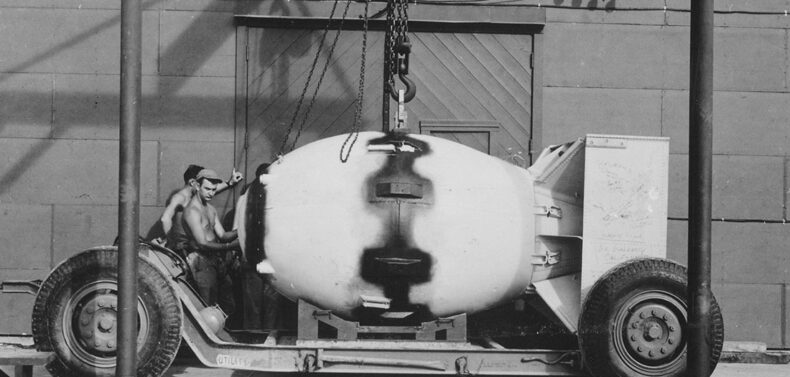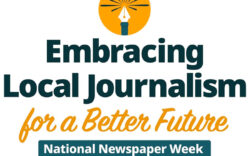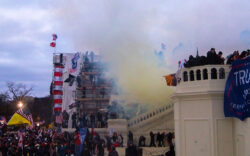“First we got the bomb and that was good/ ‘Cause we love peace and motherhood/ Then Russia got the bomb, but that’s OK/ ‘Cause the balance of power’s maintained that way/ Who’s next?” So sang musical satirist Tom Lehrer in 1965, blending mordant comedy with the serious threat of nuclear proliferation.
Lehrer died at age 97 on July 26, but his satirical song resonates today as people around the globe commemorate the 80th anniversary of the World War II atomic bombings of the Japanese cities of Hiroshima and Nagasaki on Aug. 6 and 9, 1945. The Atomic Age that ended the war ushered in a postwar arms race between the United States and the Soviet Union.
By 1949, the USSR had “the bomb” and Cold War tensions escalated. In 1952 American ally Great Britain exploded a bomb of its own. France followed suit in 1960. China debuted its atomic bomb in 1964, an event noted in Lehrer’s sardonic lyrics: “China’s got the bomb, but have no fears/ They can’t wipe us out for at least five years.” The once exclusive “nuclear club” gained new members. India detonated an atomic bomb in 1974, Pakistan did so in 1998 and North Korea joined the club in 2006.
Israel is the ninth member of the nuclear club. Though Israel does not officially acknowledge its atomic arsenal, in 1976 former Israeli Defense Minister Moshe Dayan said Israel had nuclear warheads and missiles to deliver them. Again the satiric song by Tom Lehrer seemed prescient: “Israel’s getting tense/ Wants one in self defense/ The Lord’s our shepherd, says the psalm/ But just in case, we better get a bomb.”
Though nine countries possess nuclear weapons, terrorist groups could also crash their way into the club if they stole, bought or built an atomic device or spread radiation with a “dirty bomb” that could spew contamination without a nuclear explosion. In a column that I wrote for The Atlanta Constitution in 1979, I said that theft of high-level radioactive material “could sound the death knell for the Bill of Rights.” I cited Stanford University law professor John Barton’s report to the Nuclear Regulatory Commission saying a nuclear threat by terrorists could result in widespread government surveillance, detention without trial, a national nuclear police force and infiltration of anti-nuclear organizations. Today, in a time of growing authoritarian trends in America and around the world, Barton’s warning still applies.
Since 1947 the Bulletin of the Atomic Scientists has maintained its grimly famous “Doomsday Clock” dramatizing the scientists’ assessment of the risk of atomic war, nuclear proliferation, environmental destruction, pandemics and threats from the new technology of artificial intelligence. The hands on the clock are ticking closer to the midnight of Armageddon. Even during the brief but tense Cuban Missile Crisis of 1962, the clock’s hands were at seven minutes to midnight. After a nuclear test ban treaty between the U.S. and the Soviet Union in 1963, the symbolic clock’s hands were moved back to 12 minutes to midnight. Today the hands on the Doomsday Clock are set at 89 seconds to midnight—the closest ever.
When the clock was reset on Jan. 28, spokesman Daniel Holz, a professor of astronomy and astrophysics at the University of Chicago, said in a somber warning that, “The world has not made sufficient progress on existential risks threatening humanity. In setting the clock closer to midnight, we send a stark signal. Every second of delay in reversing course increases the probability of global disaster.”
In 1980 I interviewed Senji Yamaguchi, a survivor of the Nagasaki atomic bomb. He told me a horror story of seeing “people scorched black like charcoal, people without arms or legs.” He recalled seeing a wailing woman carrying the headless body of her baby. “No pen, no poet, no genius could put on paper what I saw that day,” he said, remembering the day a single bomb devastated Nagasaki.
Today there are more than 12,000 nuclear weapons in the world’s stockpiles and Albert Einstein’s words written in 1946 are still true in 2025: “The unleashed power of the atom has changed everything save our modes of thinking, and thus we drift toward unparalleled catastrophe.”
Like what you just read? Support Flagpole by making a donation today. Every dollar you give helps fund our ongoing mission to provide Athens with quality, independent journalism.










